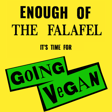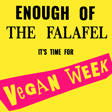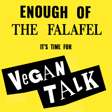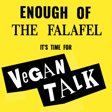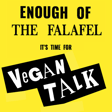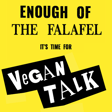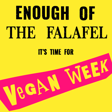
173- European wolves under fire, whilst Italian deer spared...for now
Is it because they're cute? Are Italians more forgiving? Or is it simply that the deer aren't a threat to animal ag? Either way, another mixed bag of news this week, with some animals' outcomes improving, whilst others are not so lucky. Julie, Mark & Ant sit down to report on, comment & dissect eight stories from the last week or so- all of which have a vegan or animal rights slant.
****************
Enough of the Falafel is a community of people who love keeping on top of the latest news in the world of veganism & animal rights. With the Vegan Week podcast, we aim to keep listeners (& ourselves) informed & up-to-date with the latest developments that affect vegans & non-human animals; giving insight, whilst staying balanced; remaining true to our vegan ethics, whilst constantly seeking to grow & develop.
Each week we look through news stories from the past 7 days in the world of veganism & animal rights.
If you spot any news stories that might catch our fancy, or have an idea for a discussion topic, get in touch via enoughofthefalafel@gmail.com.
******************
This week's stories:
https://plantbasednews.org/culture/massive-attack-co-op-plant-based/
https://www.foodanddrinktechnology.com/news/58801/vegetarian-diet-beats-vegan-for-the-prevention-of-diabetes-according-to-university-of-reading-study/
https://www.facebook.com/photo?fbid=1018284490390484&set=a.569455348606736 (I struggled to find more on this; are you happy to cover this Julie, or I can find another story that might have more content on it?)
https://www.yahoo.com/news/starmer-could-weaken-animal-protection-112611221.html?guccounter=1&guce_referrer=aHR0cHM6Ly93d3cuZ29vZ2xlLmNvbS8&guce_referrer_sig=AQAAAL8IVPW0ja5WRw7AP2Z8-OuMAcCbWz3kfu-cyVLCsQ_RpGsLdCYqqXTvll8sbPyH990YvevhHVHrar5cV_ot6PKqpkaSh3kOgSwcS7f_uhmqtX-4EKjpSgow6Ksn1-8w1qiEyQwKW_pkZuWPzdXl_RRzkaU0b8mrzgEjeZPHZgcl
https://www.farminguk.com/news/iceland-abandons-its-2025-cage-free-egg-commitment_66538.html
https://www.bbc.co.uk/news/articles/c3e5398lp51o
https://www.theanimalreader.com/2025/05/08/eu-parliament-votes-to-weaken-protection-for-wolves-sparking-outrage-from-conservationists/
https://euroweeklynews.com/2025/05/14/how-italys-deer-outsmarted-the-hunters-and-the-law/
****************
Thanks everyone for listening; give us a rating and drop us a message to say "hi"; it'll make our day!
Julie, Mark & Ant
